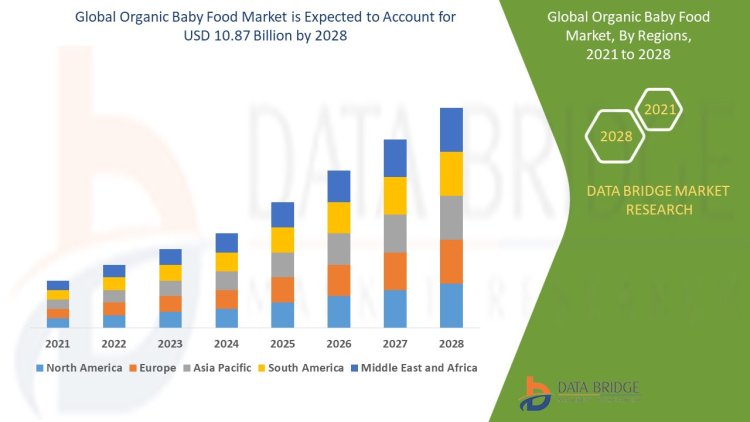Organic Baby Food: Benefits, Market Trends, and Consumer Preferences
The organic baby food market is expected to gain market growth in the forecast period of 2021 to 2028. Data Bridge Market Research analyses the market to reach at an estimated value of USD 10.87 billion and grow at a CAGR of 8.90% in the above-mentioned forecast period.

Introduction
Organic baby food has gained significant popularity among health-conscious parents seeking nutritious and chemical-free options for their infants. Made from organic ingredients without synthetic pesticides, herbicides, or genetically modified organisms (GMOs), organic baby food is considered a safer and healthier alternative to conventional baby food products. This article explores the benefits of organic baby food, market trends, and the factors influencing consumer preferences.
Benefits of Organic Baby Food
1. Free from Harmful Chemicals
-
Organic baby food is grown without synthetic pesticides, fertilizers, and herbicides, reducing the risk of chemical exposure.
-
Free from artificial preservatives, colors, and flavors that can affect infant health.
2. Higher Nutritional Value
-
Studies suggest that organic fruits and vegetables contain higher levels of antioxidants and essential nutrients.
-
Organic dairy and meat products often have higher omega-3 fatty acids, beneficial for brain development.
3. No Genetically Modified Organisms (GMOs)
-
Organic baby food is strictly regulated to ensure no GMO ingredients, providing parents with peace of mind about food safety.
4. Better Taste and Quality
-
Organically grown ingredients often have a richer, more natural flavor compared to conventionally grown produce.
-
Absence of chemical additives helps retain the natural taste of fruits, vegetables, and grains.
5. Environmentally Friendly and Sustainable
-
Organic farming practices promote biodiversity, soil health, and sustainability by avoiding harmful agricultural chemicals.
-
Reduced carbon footprint due to sustainable farming and eco-friendly packaging options.
Popular Types of Organic Baby Food
1. Purees and Pouches
-
Single-ingredient and mixed fruit/vegetable purees.
-
Convenient, portable, and easy for parents to feed their babies on the go.
2. Infant Cereals and Grains
-
Made from organic rice, oats, quinoa, and millet.
-
Fortified with essential nutrients like iron, calcium, and vitamins.
3. Organic Snacks
-
Teething biscuits, puffs, and freeze-dried fruit snacks.
-
Free from added sugars and artificial flavors.
4. Dairy and Plant-Based Alternatives
-
Organic yogurt, formula, and plant-based milk options such as almond and coconut milk.
-
Free from antibiotics and hormones.
5. Protein-Based Meals
-
Organic chicken, turkey, beef, and plant-based protein blends.
-
Balanced meals designed for proper infant growth and development.
Market Trends and Consumer Preferences
1. Increasing Demand for Clean-Label Products
-
Parents are more informed about food safety and prefer transparent ingredient labeling.
-
Growth in certified organic and non-GMO baby food brands.
2. Rise of Subscription-Based and Direct-to-Consumer Models
-
Many organic baby food brands offer home delivery and customizable subscription plans.
3. Expansion of Plant-Based and Allergen-Free Options
-
Increased demand for dairy-free, gluten-free, and soy-free baby food.
-
Growing interest in plant-based protein sources.
4. Sustainable and Eco-Friendly Packaging
-
Use of biodegradable and recyclable packaging materials.
-
Reduction in single-use plastic to align with environmental concerns.
5. Innovation in Flavors and Functional Ingredients
-
Incorporation of superfoods like chia seeds, flaxseeds, and probiotics for digestive health.
-
Unique flavor combinations to introduce infants to diverse tastes early.
Challenges in the Organic Baby Food Market
-
Higher Cost: Organic products are often more expensive due to stringent farming regulations and certification requirements.
-
Shorter Shelf Life: Lack of preservatives results in a reduced shelf life compared to conventional baby food.
-
Limited Availability: Some organic baby food products are not widely accessible in certain regions.
-
Regulatory Compliance: Strict organic certification and labeling standards require thorough monitoring and compliance.
Source : https://www.databridgemarketresearch.com/reports/global-organic-baby-food-market
Conclusion
Organic baby food is becoming an essential choice for parents who prioritize health, safety, and sustainability. With growing awareness and demand, the market continues to expand, offering innovative, nutrient-dense, and eco-friendly options for infant nutrition. As more consumers embrace organic living, the future of organic baby food remains promising, driven by transparency, quality, and environmental responsibility.
Other Trending Reports
https://www.databridgemarketresearch.com/reports/global-chorea-treatment-market
https://www.databridgemarketresearch.com/reports/global-organosheet-market
https://www.databridgemarketresearch.com/reports/global-brook-speigler-syndrome-cylindroma-market
https://www.databridgemarketresearch.com/reports/global-pumpkin-candles-market
https://www.databridgemarketresearch.com/reports/global-vapor-barrier-films-market
https://www.databridgemarketresearch.com/reports/global-tofacitinib-market
https://www.databridgemarketresearch.com/reports/global-scrambled-egg-mix-market
https://www.databridgemarketresearch.com/reports/global-intelligent-occupancy-sensor-market
https://www.databridgemarketresearch.com/reports/global-disposable-surgical-drapes-and-gowns-market
https://www.databridgemarketresearch.com/reports/global-sme-force-automation-market
What's Your Reaction?















.jpg)
.jpg)


